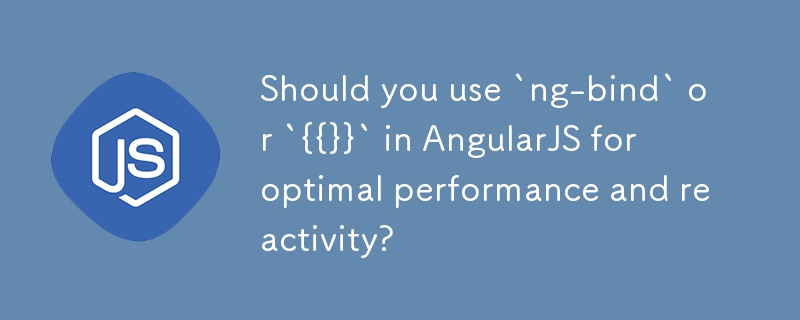Home >Web Front-end >JS Tutorial >Should you use `ng-bind` or `{{}}` in AngularJS for optimal performance and reactivity?
Should you use `ng-bind` or `{{}}` in AngularJS for optimal performance and reactivity?
- Patricia ArquetteOriginal
- 2024-11-14 21:19:02700browse

Ng-bind vs. {{}} in Angular: Performance and Reactivity
In AngularJS, ng-bind and {{}} bindings offer different approaches for displaying dynamic data. Ng-bind is generally considered preferable due to its superior performance and reactivity.
Visibility:
- Ng-bind ensures that the variable is only visible when it is fully loaded. It utilizes ng-cloak to prevent premature content display during bootstrapping.
- {{}} bindings may display uninitialized placeholders in the HTML until Angular initializes, which can be visually distracting.
Performance:
- Ng-bind is a directive that creates a watcher on the bound variable, updating the view only when there is a change.
- {{}} bindings are interpolated in every Angular digest cycle, regardless of whether the value has changed or not, leading to decreased performance.
- Extensive use of {{}} bindings in large applications can result in significant performance degradation.
Reactivity:
- {{}} bindings are dirt checked in every digest cycle, even if the value remains unchanged.
- Ng-bind triggers an update only when the bound variable actually changes, improving responsiveness and performance.
Recommendations:
- Prefer ng-bind over {{}} bindings for performance-critical scenarios.
- Use {{}} bindings only for small chunks of data or when performance is not a concern.
- Consider using Angular 1.3x's bindonce feature (::) to optimize bindings that are not expected to change frequently.
Translation Modules and Filters:
- When using translation modules like Angular-Translate, directives are recommended over bracket annotations for better performance.
- For filter functionality, directives that call custom filters are preferable to {{}} bindings with inline filter expressions.
Conclusion:
Ng-bind provides superior performance and reactivity than {{}} bindings. For optimal application performance, it is advisable to use ng-bind whenever possible, especially in large and data-intensive applications. {{}} bindings should be reserved for smaller-scale dynamic content.
The above is the detailed content of Should you use `ng-bind` or `{{}}` in AngularJS for optimal performance and reactivity?. For more information, please follow other related articles on the PHP Chinese website!
Related articles
See more- An in-depth analysis of the Bootstrap list group component
- Detailed explanation of JavaScript function currying
- Complete example of JS password generation and strength detection (with demo source code download)
- Angularjs integrates WeChat UI (weui)
- How to quickly switch between Traditional Chinese and Simplified Chinese with JavaScript and the trick for websites to support switching between Simplified and Traditional Chinese_javascript skills

